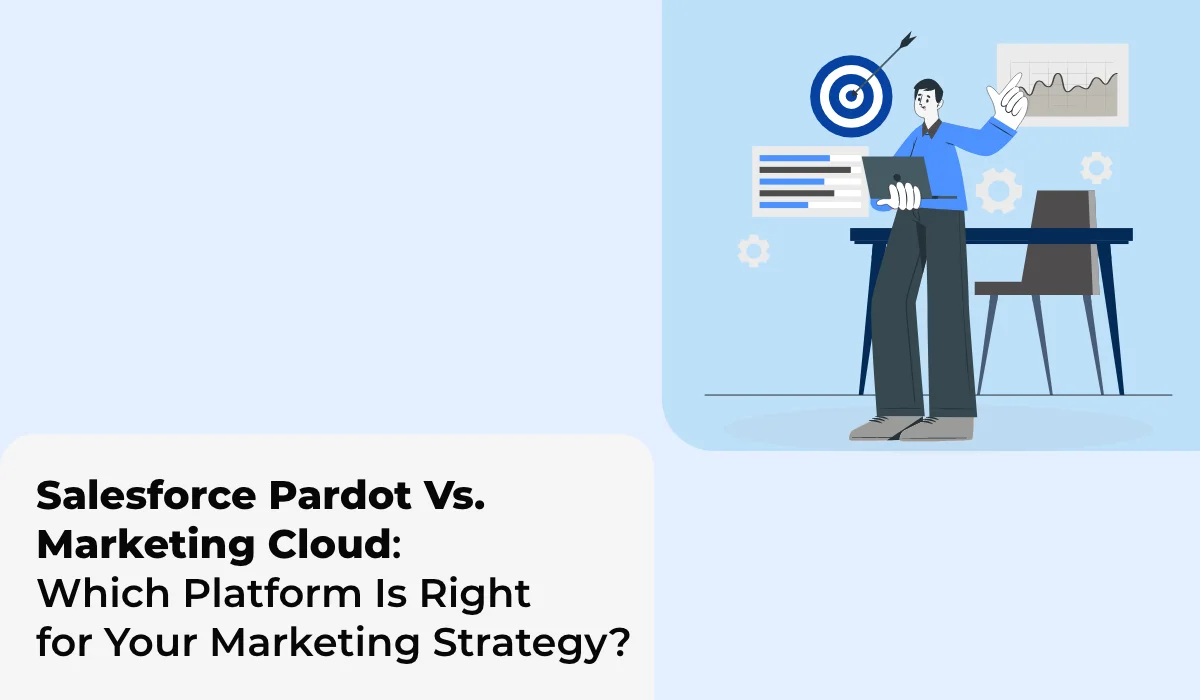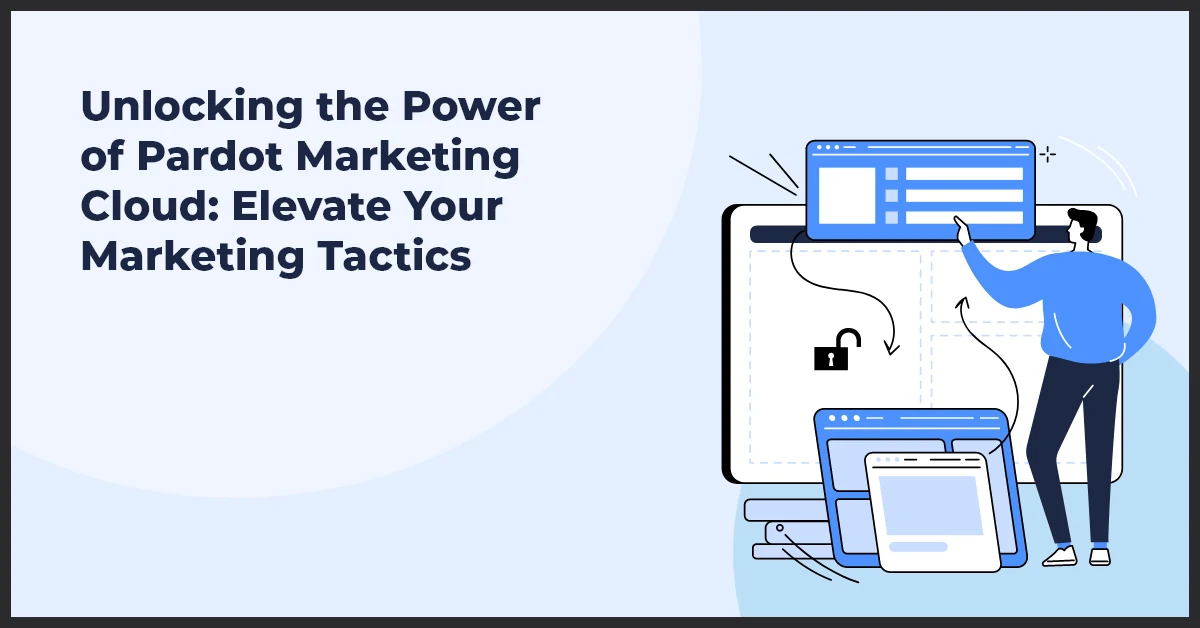Salesforce Pardot Vs. Marketing Cloud: Which Platform Is Right for Your Marketing Strategy?

Published on: March 29, 2023
Updated on: October 24, 2024
1309 Views
- Pardot
10 min read
Salesforce Pardot vs. Marketing Cloud: Choosing the Perfect Marketing Automation Platform
Welcome to our comprehensive guide on Salesforce Pardot vs. Marketing Cloud, two dynamic marketing automation platforms that can elevate your marketing efforts to new heights. In today's competitive digital landscape, selecting the right marketing automation platform is crucial for businesses looking to effectively engage their audience, drive conversions, and achieve their marketing goals.
Both Salesforce Pardot and Marketing Cloud offer an array of powerful features and capabilities, tailored to meet the unique needs of marketers. However, understanding the differences between these two platforms is key to making an informed decision that aligns with your business objectives. In this article, we will provide an overview of Salesforce Pardot and Marketing Cloud, emphasize the importance of selecting the right marketing automation platform, and offer a brief comparison of their key features and functionalities.
Let's start by stating the obvious - AUTOMATION is the keyword in marketing. The marketing automation industry stood at $5.2 billion at the end of 2022. And it is likely to touch $9.5 billion by 2027. As marketers look to embrace automation, they are overwhelmed with the choices at hand. Are you also in a dilemma on whether to choose Pardot or Marketing Cloud? Then let’s crack it for you.
Salesforce Pardot and Salesforce Marketing Cloud are among the most popular marketing automation platforms. They help businesses improve their lead generation and customer engagement efforts.
So, is there a difference between Pardot and Salesforce Marketing Cloud? Which among the two will best suit your organization? How are they priced? We will answer all these questions in this blog post.
What Is Salesforce Pardot?
Pardot is a go-to marketing automation platform for small businesses. It helps them generate and nurture leads. It also helps in improving marketing efficiency, and aligning sales and marketing efforts.
Pardot integrates with Salesforce CRM. This makes it a popular choice for B2B marketers using it for their sales operations. A Salesforce Pardot consultant can create and execute automated campaigns across many channels. These include email, social media, and paid advertising.
Pardot offers lead scoring and grading. This helps businesses focus on leads based on their level of engagement and potential conversion. The platform provides detailed analytics and reporting on marketing performance. It allows businesses to measure the success of their campaigns. It enables data-driven decisions, improving the marketing strategy. With the right Salesforce Pardot certification, you can prepare a team to take your marketing campaign to the next level.
What Is Salesforce Marketing Cloud?
Salesforce Marketing Cloud is a powerful marketing automation platform. It allows businesses to connect with their customers across multiple channels - email, mobile, social media, and web.
The platform provides tools and services to help businesses attract, engage, and retain customers. These include email marketing, mobile messaging, social media advertising, web personalization, and more. With Marketing Cloud, your team can create personalized and targeted campaigns. These help engage customers at every stage of the buying journey.
Marketing Cloud allows organizations to create a unified customer view. It provides a consistent, personalized experience across all customer touchpoints. Robust reporting and analytics capabilities, allow businesses to track campaign performance and ROI. With Marketing Cloud, you can make data-driven decisions to optimize your marketing efforts. It integrates seamlessly with other Salesforce products like Sales Cloud and Service Cloud.
Salesforce Pardot Vs. Marketing Cloud – Which Is Better?
Pardot and Marketing Cloud come from the same stable and offer similar functionalities. Hence, organizations often face a dilemma when choosing one. They differ and aim at different business models. Let us look at the major differences between the two and help you choose the best fit.
Target Audience
Pardot has features that help B2B organizations. It lets you generate high-quality leads and nurture them through the sales funnel. It is useful for driving revenue growth. Pardot's lead scoring and nurturing capabilities are useful for organizations with longer sales cycles. It allows you to stay top-of-mind with leads over an extended period.
Salesforce Marketing Cloud targets B2C businesses of all sizes and industries. It helps businesses that need to engage with customers across multiple channels, including email, mobile, social media, and the web. It helps you create personalized, targeted campaigns that drive customer engagement and loyalty.
Functionality
As Salesforce Pardot targets B2B marketing automation, it comes with corresponding features. They are designed to help businesses generate and nurture high-quality leads and boost revenue. The key features of this tool include the following:
- Lead Generation: Pardot provides tools to help businesses capture leads. You can do this using forms, landing pages, and email campaigns.
- Lead Nurturing: With Pardot, your business can stay top-of-mind with leads through automated email campaigns and lead scoring.
- Sales Alignment: It easily integrates with Salesforce CRM, enabling sales teams to access valuable marketing data and collaborate with marketing teams on lead management and sales follow-up.
- Reporting and Analytics: It provides detailed reporting and analytics on campaign performance. These include lead engagement, and revenue impact.
Marketing Cloud, on the other hand, focuses on B2C marketing automation. Businesses use it to engage with customers across multiple channels, including email, mobile, social media, and the web. Some of the key features of Marketing Cloud include the following:
- Email Marketing: Marketing Cloud provides robust email marketing tools, including drag-and-drop email builders, A/B testing, and automation workflows.
- Mobile Messaging: It enables businesses to create and send targeted mobile messages through SMS, push notifications, and in-app messaging.
- Social Media Advertising: It allows businesses to create and manage social media advertising campaigns across multiple platforms, including Facebook, Instagram, Twitter, and LinkedIn.
- Web Personalization: Marketing Cloud provides tools to create personalized experiences for website visitors. These include dynamic content and personalized recommendations.
Ease of Use
Salesforce Pardot can be more complex to set up and use, particularly for users new to marketing automation. Pardot requires technical knowledge to set up integrations and configure custom fields and workflows. Your organization must put its team through Salesforce Pardot specialist certification.
Yet, the intuitive interface and drag-and-drop functionality make creating and executing Pardot and Salesforce campaigns easy once set up. Pardot also provides a range of resources and training materials, including Salesforce Pardot certification questions to help your team gain command over this tool.
In contrast, Salesforce Marketing Cloud is more user-friendly and easier to use than Pardot. Marketing Cloud's interface is easy to navigate, and you can access the features through drag-and-drop functionality. It offers a range of templates and pre-built journeys to help users create campaigns quickly and easily.
However, Marketing Cloud's advanced features, such as AI-powered personalization and predictive analytics, may require more technical expertise to set up and use effectively.
Integration
Both platforms integrate with Salesforce CRM and other third-party tools.
Pardot integrates with Salesforce Sales Cloud. It allows your sales teams to access and track leads generated by marketing efforts.
Marketing Cloud is a more robust platform and allows more integration features. It also integrates with other marketing technologies, such as Google Analytics and AdWords. Marketing Cloud is scalable thus empowering B2C marketers. Your team can explore advanced and personalized marketing campaigns.
Pricing
Salesforce Pardot offers three pricing plans - Growth, Plus, and Advanced. The Growth plan starts at $1,250 monthly and includes basic email marketing, lead tracking, and lead nurturing. The Plus plan is $2,500 monthly and includes additional features such as advanced email marketing, marketing automation, and ROI reporting. The advanced plan starts at $4,000 monthly and includes all of the features of the Plus plan, as well as custom user roles, advanced reporting, and API access.
Marketing Cloud's more complex pricing structure depends on the specific features and products you choose. It offers a range of products, including Email Studio, Mobile Studio, Social Studio, Advertising Studio, and Journey Builder. Each product has its pricing and features, and prices vary based on the number of contacts and volume of emails or messages sent. Though the starting price is the same as Pardot at $1,250 monthly, it is important to choose the right features to get the best out of this tool.
Salesforce: The Foundation of Pardot and Marketing Cloud
When it comes to marketing automation and customer relationship management (CRM), Salesforce stands out as the foundation for both Pardot and Marketing Cloud. With its robust capabilities and extensive features, Salesforce empowers businesses to effectively manage their marketing efforts and drive growth.
A. Overview of Salesforce's capabilities and features
Salesforce offers a wide range of capabilities and features that make it a leading choice for businesses of all sizes. Its comprehensive CRM platform allows companies to track and manage customer interactions, enabling them to gain valuable insights and enhance customer relationships. Additionally, Salesforce provides advanced tools for campaign management, lead nurturing, and personalized marketing, helping businesses deliver targeted and impactful messaging to their audiences.
B. Integration with other Salesforce products and benefits
One of the major benefits of using Salesforce as the foundation for Pardot and Marketing Cloud is its seamless integration with other Salesforce products. This integration enables businesses to synchronize data, streamline processes, and gain a holistic view of their sales and marketing activities. With Salesforce, businesses can leverage the power of Pardot's marketing automation and Marketing Cloud's personalized engagement, all within a unified platform.
C. How Salesforce drives alignment between sales and marketing efforts
Salesforce plays a vital role in aligning sales and marketing efforts by providing a centralized platform for collaboration and communication. The platform facilitates close collaboration between sales and marketing teams, allowing them to work together towards a common goal. With Salesforce, businesses can align their sales and marketing strategies, share valuable insights, and ensure a seamless handoff of leads from marketing to sales, resulting in increased efficiency and improved revenue generation.
The Final Verdict - Which Platform is Right for Your Marketing Strategy?
Salesforce Pardot and Salesforce Marketing Cloud are both powerful marketing automation tools. Pardot is focused on B2B lead generation and nurturing, whereas Marketing Cloud is designed for more complex B2C marketing automation with advanced features for omnichannel campaigns.
However, the choice between the two isn't as simple as it sounds, and you need to choose one over the other depending on your specific marketing needs and goals. It is important to carefully evaluate each platform's features and pricing to determine which is the best fit for your business.
If you are looking for the perfect marketing automation tool for your organization, Growth Natives can help. We are Salesforce Ridge Partners and have in-depth knowledge of the Salesforce ecosystem. Our team implements the best marketing automation platform after evaluating your business needs and trains your team to use the marketing automation platforms optimally. Email us at info@growthnatives.com or call us at our toll-free number +1 855-693-4769 for Salesforce consultancy.
Sources:
https://www.marketsandmarkets.com/Market-Reports/marketing-automation-software-market-155627928.html
Frequently Asked Questions
No, Salesforce Marketing Cloud is not the same as Pardot. While both are marketing automation platforms offered by Salesforce, they serve different purposes and cater to different needs. Marketing Cloud is more focused on enterprise-level marketing automation and customer engagement across multiple channels, while Pardot is geared towards B2B marketing automation and lead generation.
Pardot is a marketing automation platform designed for B2B marketing and lead generation, while Sales Cloud is a customer relationship management (CRM) platform designed to manage sales processes and customer interactions. Pardot focuses on generating and nurturing leads, while Sales Cloud focuses on managing customer relationships and closing deals.
Salesforce is a comprehensive CRM platform that includes various products and services, including Sales Cloud, Service Cloud, and Marketing Cloud. Marketing Cloud, on the other hand, is a specific product within the Salesforce ecosystem that is focused on marketing automation, customer engagement, and analytics.
Pardot is primarily designed for B2B marketing, although it can also be used for B2C marketing. Its features are particularly suited for businesses that sell products or services to other businesses and need to manage and nurture leads through the sales cycle.



